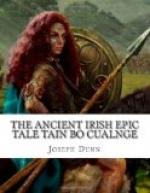“To its hurt the host goes east, Seeking Cualnge’s wild Brown bull. [2]Warriors’ cleaving there shall be,[2] ’Neath Cuchulain’s baneful sword!
“No gain will their[b]
stout bull be,
For which sharp-armed war
will rage;
At the fall of each head’s
skull
Erin’s every tribe shall
weep!
“I have nothing to relate
As regards Dechtire’s
son.[c]
Men and women hear the tale
Of this fork, how it came
here!”
[1-1] Stowe.
[a] Literally, ‘painless,’
referring to Cuchulain’s exemption from the
cess or ‘debility’
of the Ulstermen.
[2-2] Reading with Stowe and H. 1. 13.
[b] Translating from Stowe; LL. has ‘his’ or ‘its.’
[c] That is, Cuchulain.
After this lay: “Let us pitch our booths and tents,” said Ailill, “and let us make ready food and drink, and let us sing songs and strike up harps, and let us eat and [W.807.] regale ourselves, for, of a truth, never before nor since knew the men of Erin a night of encampment or of entrenchment that held sorer discomfort or distress for them than yester-night. [1]Let us give heed to the manner of folk to whom we go and let us hear somewhat of their deeds and famous tales."[1]
[1-1] LU. and YBL. 329-330.
They raised their booths and pitched their tents. They got ready [LL.fo.61b.] their food and drink, and songs were sung and harping intoned by them, and feasting and eating indulged in, [2]and they were told of the feats of Cuchulain.[2]
[2-2] LU. and YBL. 331.
And Ailill inquired of Fergus: “I marvel and wonder who could have come to us to our lands and slain so quickly the four that had gone out before us. Is it likely that Conchobar son of Fachtna Fatach (’the Mighty’), High King of Ulster, has come to us?” “It is never likely that he has,” Fergus answered; “for a shame it would be to speak ill of him in his absence. There is nothing he would not stake for the sake of his honour. For if he had come hither [3]to the border of the land[3], there would have come armies and troops and the pick of the men of Erin that are with him. And even though against him in one and the same place, and in one mass and one march and one camp, and on one and the same hill were the men of Erin and Alba, Britons and Saxons, he would give them battle, before him they would break and it is not he that would be routed.”
[3-3] LU. and YBL. 333.
“A question, then: Who would be like to have come to us? Is it like that Cuscraid Mend (’the Stammerer’) of Macha would have come, Conchobar’s son, from Inis Cuscraid?” “Nay then, it is not; he, the son of the High King,” Fergus answered. “There is nothing he would not hazard for the sake of his honour. For were it he that had come hither, there would have come the [W.827.] sons of kings and the royal leaders [1]of Ulster and Erin[1] that are serving as hirelings with him. And though there might be against him in one and the same place, in one mass and one march and one camp, and on one and the same hill the men of Erin and Alba, Britons and Saxons, he would give them battle, before him they would break and it is not he that would be routed.”




